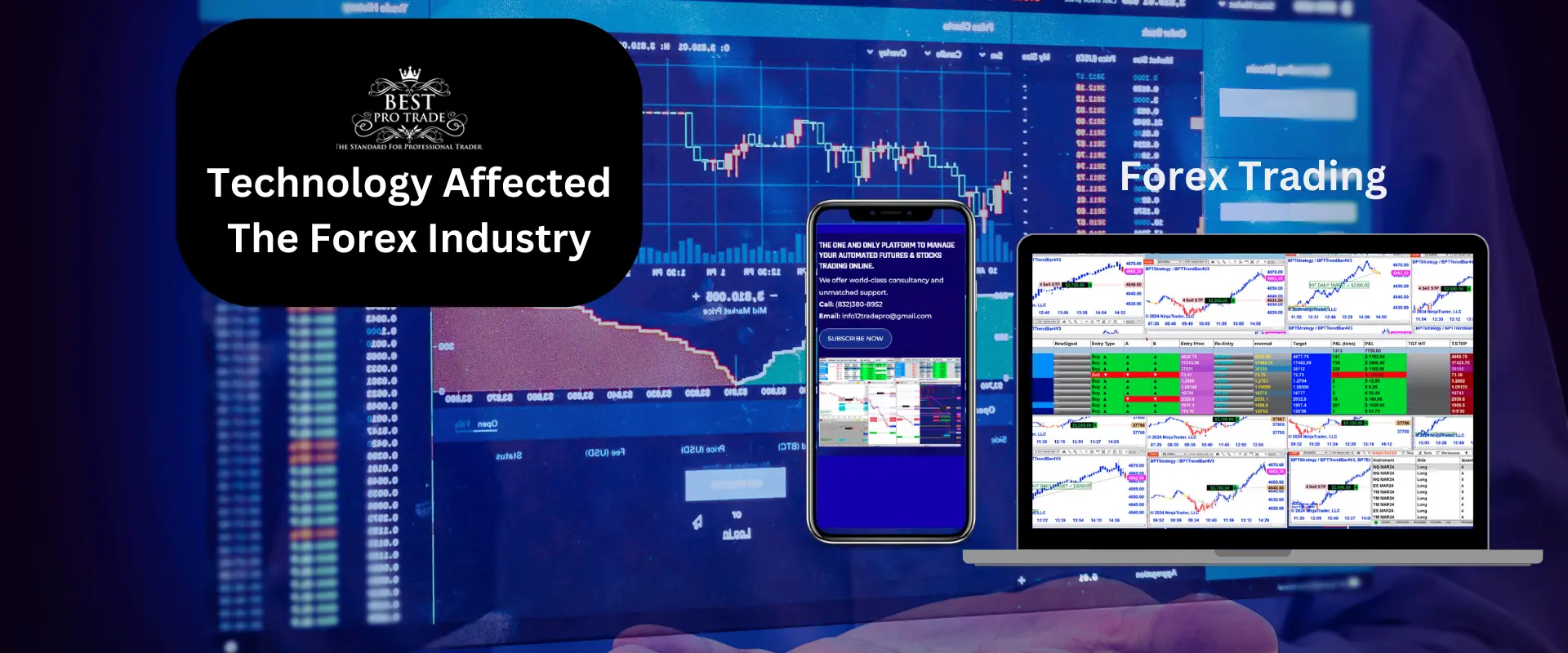The forex industry, once a realm dominated by traditional trading methods, has undergone a profound transformation thanks to advancements in technology. From automated trading systems to real-time data analysis, technology has not just affected but revolutionized the forex landscape. Let’s delve into the key areas where technology has made its mark.
Over time, there is this continued conversation on how the internet shaped the future of forex, futures, and stock trading, which began in the 1990s. Now, there is a conversation on how technology is affecting and attempting to shape the way we trade. With the introduction of new global tech daily, such as AI, blockchain tech, and cloud computing, among others
There is an uncertainty that faces forex, futures, and stock trading with the rise of new technology. Although, this might profit traders in anticipation of dwelling opportunities. Also, there is the topic of auto trading trade pro and trading bot in the forex industry. We will be looking into some key issues regarding tech and foreign exchange. And also how the internet helped shape the future of forex, futures, and stock trading.
Automated Trading Systems: Enhancing Efficiency and Accuracy
One of the most significant impacts of technology on the forex industry is the advent of automated trading systems. These systems, powered by algorithms and AI, execute trades automatically based on predefined criteria. They eliminate human error, ensure swift execution, and can analyze vast amounts of data within seconds, leading to more informed trading decisions.
Real-Time Data Analysis: Empowering Traders with Insights
Gone are the days of relying solely on historical data. Technology has enabled real-time data analysis, providing traders with up-to-the-second information on market trends, currency fluctuations, and geopolitical events. This instantaneous access to data empowers traders to make timely decisions and capitalize on opportunities as they arise.
Mobile Trading Apps: Trading on the Go
The rise of mobile trading apps has democratized forex trading, allowing anyone with a smartphone to participate in the market. These apps offer intuitive interfaces, real-time updates, and the ability to execute trades from anywhere, giving traders unprecedented flexibility and convenience.
Algorithmic Trading: Leveraging Complex Algorithms for Profit
Algorithmic trading, also known as algo trading, utilizes complex algorithms to execute trades automatically based on predetermined criteria. These algorithms can analyze market conditions, identify patterns, and execute trades at optimal times, often faster than human traders can react. This level of speed and precision has transformed how trades are conducted in the forex market.
Blockchain Technology: Ensuring Security and Transparency
Blockchain technology has also left its mark on the forex industry, particularly in terms of security and transparency. Distributed ledger technology ensures that transactions are secure, immutable, and transparent, reducing the risk of fraud and enhancing trust among market participants.
Data Processing Methods: Embracing Automation and Efficiency
Technology has revolutionized data processing methods in forex trading. Automated systems powered by advanced algorithms can process vast amounts of data with precision and speed. These systems not only reduce human error but also streamline the analysis of market trends, economic indicators, and currency fluctuations, providing traders with valuable insights for informed decision-making.
The Volume of Processed Data: Managing Big Data Effectively
The sheer volume of data in forex trading can be overwhelming without the right technological tools. Thanks to advancements in data storage and processing capabilities, traders can now manage big data effectively. This includes historical market data, real-time updates, news feeds, and social media sentiment analysis, all of which contribute to a comprehensive understanding of market conditions.
The Speed in Data Processing: Real-Time Insights for Timely Actions
Speed is of the essence in forex trading, and technology has significantly improved the speed at which data is processed. Real-time data feeds, high-frequency trading algorithms, and low-latency trading platforms enable traders to receive and act upon market information almost instantaneously. This agility is crucial in seizing opportunities and mitigating risks in a dynamic market environment.
Best Pro Trade Forex Yesterday!

Understanding the history of forex and how it was before would make it easy to know the effects of tech on forex, futures, and stock today.
Haven understood that FX trading rose with the barter system of trading goods for goods. And with the eventual struggle to place a mutual value on commodities, there was the creation of coins and paper money. Which, we all accepted in a bid to stabilize the forex, futures, and stock market by creating a generally accepted means of exchange.
So, from trading with bulky goods to coins, then paper money, forex evolved. Nevertheless, this is a far cry from what we have today.
Forex, stocks, and futures essentially drive on information, and slow or limited access to this information can bring about loss or missed opportunities in the market. This is because the free-floating system of 1973 caused the market forces of demand and supply to determine the currency market.
In a bid to regulate forex trading, there was the creation of the first-ever forex market in the 17th century in Amsterdam. Nevertheless, with a lack of innovative technology, information remained slow, and forex, futures, and stock trading remained inaccessible to a lot of people.
Forex of yesterday was a thing for governments, globally recognized corporations, financial institutions, and international banks. Which, you would agree, significantly changed today.
Best Pro Trade Forex Today!
Since the era of large institutional firms, large spreads and slow access to information. Forex has evolved into a fast, accessible market globally with the advent of the internet. Today, individuals globally can trade currencies, futures, and stocks conveniently.
Today’s Forex is such that traders have access to information with the click of a button.
Information about numerous factors that influence forex market rates such as inflation, debt, political structure, etc. is now accessible. Prompt access to this information helps traders make informed decisions in the market. Thus minimizing risks and maximizing profit.
Several websites and international brokers offer retail traders daily updates and insight into the forex, futures, and stock market on expected information. One of which is the famous NFP on the first Friday of every month.
Best Pro Trade
Also, the internet and advanced technology have championed the rise of online forex brokers with more accessibility. These online brokers, both local and international, make it easier for individuals globally to engage in foreign exchange. The large spread is limited, and leverage is given to retail traders by these brokers to participate in forex, futures, and stock trading.
Platforms such as mt4 and mt5, among other trading platforms, give individuals access to the FX market globally. They also provide indicators and signals to help beginners to trade FX more profitably. Although this does not guarantee success in the market, the FX market is a volatile market with massive risk attributed to it. With the right mentorship and training, a beginner can trade profitably.
Conclusion
There is also the introduction of bots that carries out automated trading, which has been programmed into them by traders. These and many more are the significant effects of technology on the forex industry. This isn’t stopping anytime soon.
Check out our YouTube channel to learn more about the Trade Pro automated trading system.

